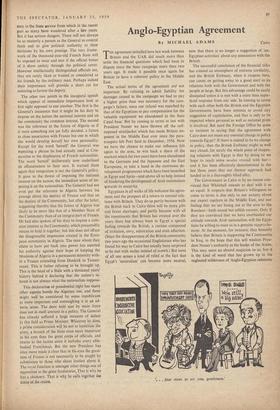Anglo-Egyptian Agreement
THE agreement initialled here last week between Britain and the UAR did much more than settle the financial questions which had been in dispute since the Suez campaign more than two years ago. It made it possible once again for Britain to have a coherent policy in the Middle East.
The actual terms of the agreement are' not important. By refusing to admit liability for damages caused in the campaign we had to pay a higher price than was necessary for the cam- paign's failure, since our refusal was matched by that of the Egyptians to pay compensation for the valuable equipment we abandoned in the Suez Canal base. But by coming to terms at last with President Nasser we have thrown off the self- imposed straitjacket which has made Britain im- potent in the Middle East ever since the para- troopers left Port Said in December, 1956. Now we have the chance to make our influence felt again in the area, to win back a share of the markets which for two years have been abandoned to the Germans and the Japanese and the East Europeans, to take a hand in the enormous de- velopment programmes which have been launched in Egypt and Syria—and above all to help instead of hindering the development of Arab nationalism towards its maturity.
Egyptians in all walks of life welcome the agree- ment and the prospect of a return to normal rela- tions with Britain. They do so partly because with the British back in Cairo there will be more jobs and fewer shortages, and partly because with all the resentments that Britain has created over the years there has always been in Egypt_ a special feeling towards the British, a curious compound of irritation, envy, admiration and even affection. (Since the disappearance of the British community two years ago the occasional Englishman who has found his way to Cairo has usually been surprised to be met with smiles instead of scowls.) But most of all one senses a kind of relief at the fact that Egypt's 'neutralism' can become more neutral, now that there is no longer a suggestion of 'un- Egyptian activities' about any association with the British.
The successful conclusion of the financial talks has created an atmosphere of extreme cordiality, and the British Embassy, when it reopens here, can count on getting away to a good start in its relations both with the Government and with the people at large. But this advantage could be easily dissipated unless it is met with a more than super- ficial response from our side. In coming to terms with each other both the British and the Egyptian Governments have been anxious to avoid any suggestion of capitulation, and that is only to be expected where personal as well as national pride is involved. But need the Foreign Office be quite so insistent in saying that the agreement with Cairo does not mean any essential change in policy towards Egypt? If there is indeed to be no change in policy, then the,British Embassy might as well stay closed, for surely the whole point of reopen- ing relations with Egypt is that by doing so we hope to reach some modus vivendi with her— and it has been effectively demonstrated in the last three years that our former approach had landed us in a thoroughly blind alley.
The Government in Cairo is by no means con- vinced that Whitehall intends to deal with it as an equal. It suspects that Britain's willingness to come to terms is due only to our anxiety about our export markets in the Middle East, and our feeling that we are losing out in the area to the Russians—both sound but selfish reasons. Only if they are convinced that we have overhauled our attitude towards Arab nationalism will the Egyp- tians be willing to meet us in a genuine rapproche- ment. At the moment, for instance, they honestly believe that Britain is supporting the Communists in Iraq, in the hope that this will weaken Presi- dent Nasser's authority as the leader of the Arabs. This may seem an absurd suspicion to us, but it is the kind of weed that has grown up in the neglected wilderness of Anglo-Egyptian relations.
. . four more to see you, gentlemen.'










































 Previous page
Previous page